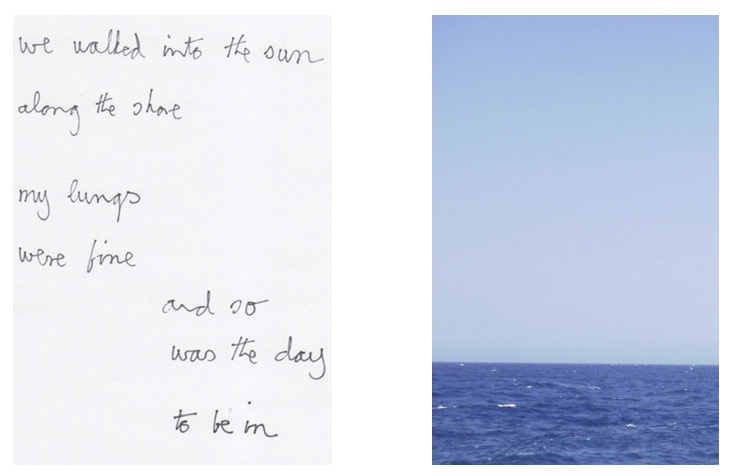sep - aug 2012
Sitting in a cafe in Ireland last week I noticed illustrations on the wall of animals with their Gaelic names underneath. Under a badger was its Gaelic word broc. “Brock” for badger is confined more or less to children's stories now, though it was in use more widely in the nineteenth century, and came up in the poetry of both Allan Ramsay and Burns in the eighteenth.
Brockburn Road, parallel to Leithland Road where I grew up in Pollok, takes its name from the Brock Burn at the foot of the road, “burn” being Scottish for a small river or rivulet. So in times past there were probably badgers in the land around the stream—a connection I hadn’t thought of before.
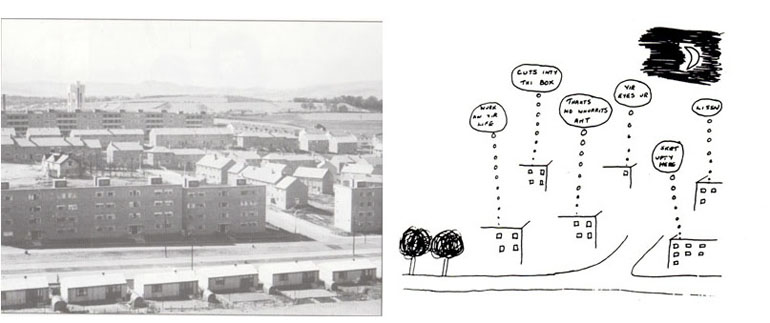
Brockburn Road is also such as I had in mind when making the drawing that concluded my 1975 dialect sequence Bunnit Husslin, with little excerpts from some of the poems appearing like bubbles as it were from the pool of language of the community. The photograph overlooking Brockburn Road taken from Crookston Castle sometime in the early 1950’s shows what I mean.

September 23rd
Glendalough.
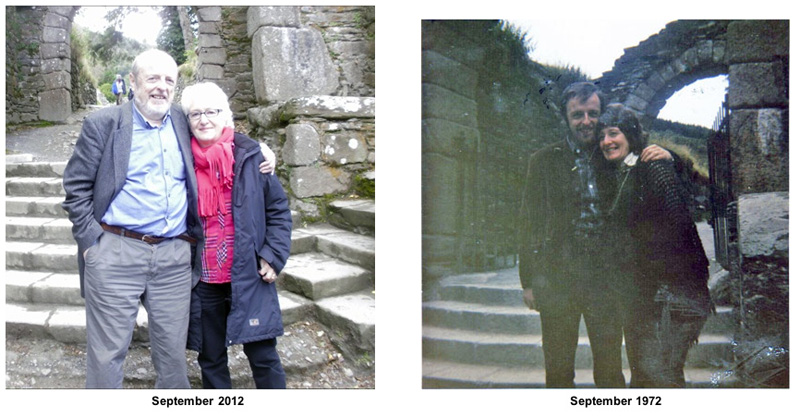


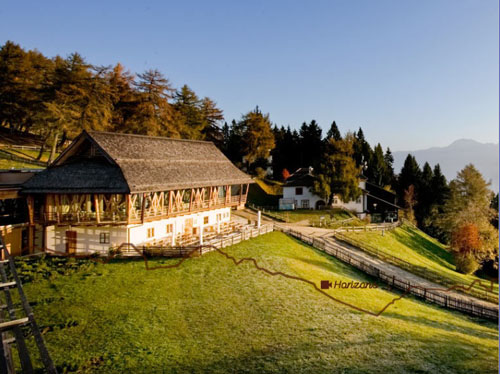

Have begun correcting the first draft of the printer’s proofs for my forthcoming Definite Articles. It seems it may be after Christmas in January or February—Etruscan Books have publication forecast simply as “Winter”— before the book appears. A pity it probably won’t make it before Christmas, but one of the benefits of working with a small publisher at least is that though it can take longer, you can be sure you get it right: spacing, font for titles, details that a big publisher might just go ahead and do or give you one shot at suggesting alternative, with Etruscan I can have a thorough say in it all. Publisher Nicholas Johnston likes to make sure I am completely happy with the end result (including the cover which I have designed along with Sonya) before it’s bound, which is one of the reasons it is great working with him.
I won’t finish doing these proofs till I come back from Moniack Mhor where I will be tutoring a residential poetry course along with Liz Lochhead from Monday to Saturday.
Moniack Mhor Writers' Centre Inverness-shire
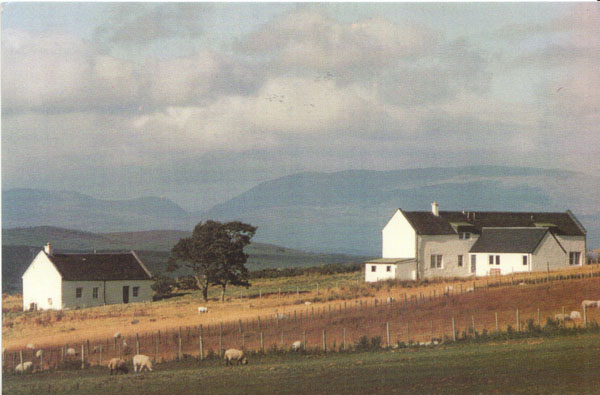
The postcard photograph here was taken some years ago and work is under way just now on building an added new structure within the grounds.
September 6th
I was sent a copy of a 1979 book of poems Another Fire becoming a City translated from the Arabic of the Iraqi Kurd Salah Faiq, with illustrations by his partner Haifa Zangana. I was very taken by the book, and ordered secondhand the only other book by the poet I could find, The Lode, the word of 1985. Salah Faiq, who had been imprisoned in the past for his efforts in the Kurdish liberation struggle, was living in London when both these books were published by Melmoth. The second volume was introduced by the poet David Gascoyne.
I know nothing of Salah Faiq’s whereabouts since that second book, and a lot has happened since 1985. I hope he is alive and still writing, he translates as a very good poet. The four pages here are from the poem “Days” in Another Fire Becoming a City.
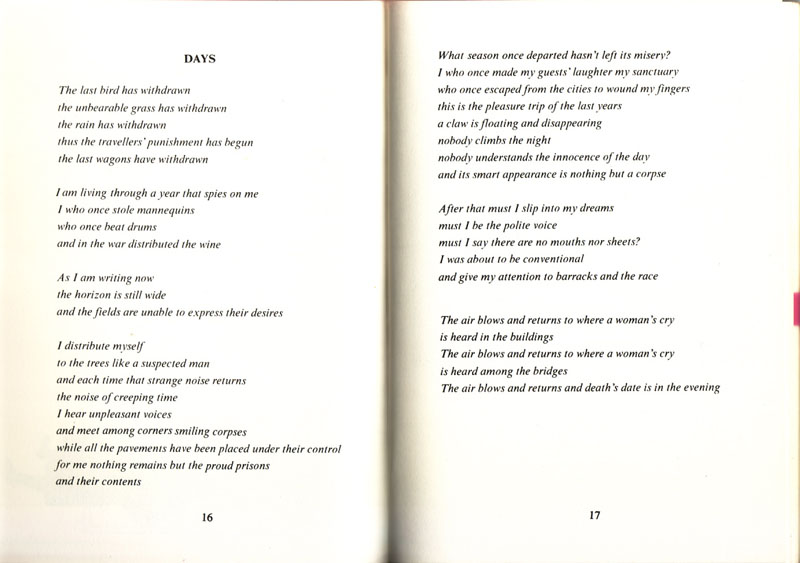
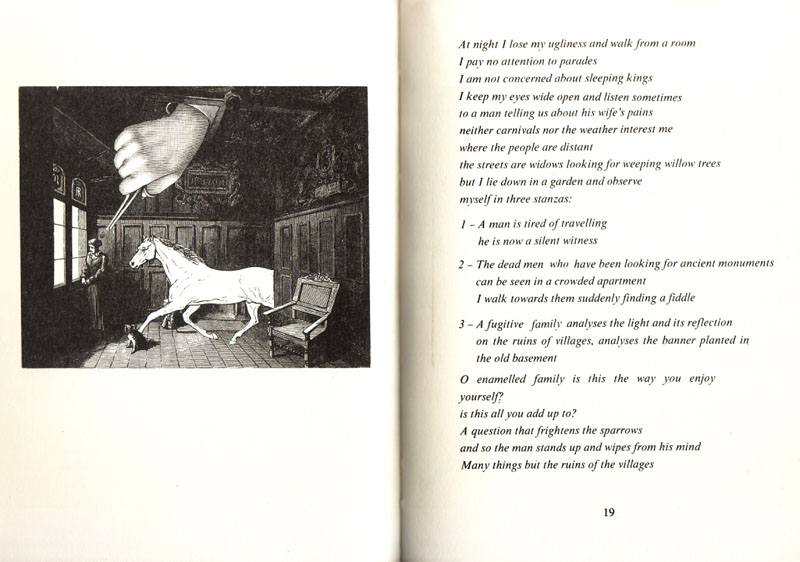
The person who sent me a copy of Another Fire Becoming a City is Hugh Humphries, chair of the Scottish Friends of Palestine. Hugh is the author of the crucially informative chronology Countdown to Catastrophe – Palestine 1948; this uses much previously unreported research to present material from January 1st to December 31st of that year including the itemisation of the ethnic cleansing of town, village and city throughout the country; forming a book which set alongside the Israeli historian Ilan Pappé’s The Ethnic Cleansing of Palestine presents the irrefutable totality of fact that has been at best ignored, in fact concealed, by the touted “official” narrative still in diplomatic play. Countdown to Catastrophe is available from the Scottish Friends of Palestine 31 Tinto Road Glasgow G43 2AL price £7 plus £2.50 p&p. The book can be downloaded in pdf for preview here where a donation is optional.

Two readings this week:
Thursday 6th September 6.30 pm. Scottish Poetry Library Edinburgh. Reading with Miriam Gamble.
Friday 7th September. 7pm CCA Glasgow. Reading and recalling the Third Eye Centre in the seventies.
Next week I will be away teaching a residential poetry course with Liz Lochhead at Moniack Mhor in Invernesshire from Monday 10th until the Saturday morning.
![]()
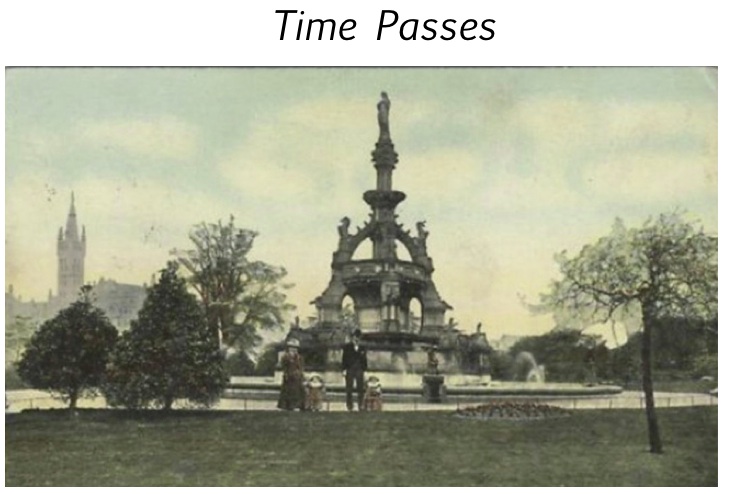
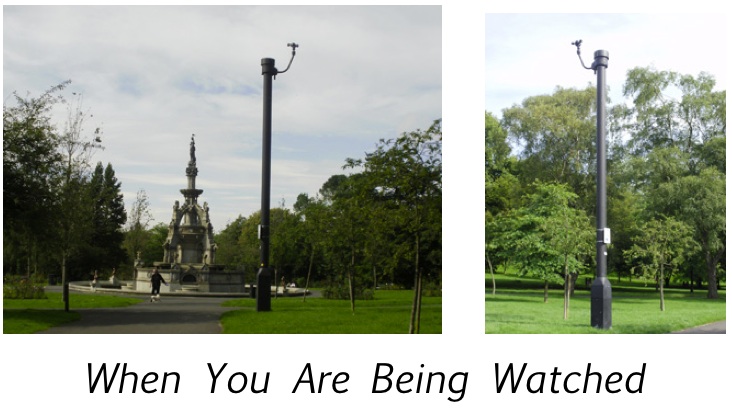
A letter in the Glasgow Herald signed by Liz Lochhead, Ian Banks, myself and others has protested at the invitation to the Israeli dance group Betsheva to perform at this year’s Edinburgh Festival. Subsequently the Herald journalist Teddy Jamieson has now emailed me saying he has “been asked to write a piece for the Sunday Herald that steps back a little and looks at the issue of cultural boycotts and ask why people are in favour of (or against) them. I just wonder if you’d be willing to tease out your thoughts on the subject?”

Have received word today I am the recipient of an award called the N.C. Kaser poetry award given from the South Tyrolese town of Lana in northern Italy. Norbert C Kaser was a poet from the district who died in 1978. The Norwegian poet Øyvind Rimbereid —who has translated me—was the last winner of the biennial award in 2010, and he nominated me for it this year.
Looking at a webpage reporting Øyvind Rimbereid’s receipt of the award in 2010 my computer’s garbled translation of the German on that page describes the prize as "looking at literature beyond the corporate patronage and predictable developments on poetry" and being " given to poets who move through artistic independence and aesthetic risk often at the edges of the large attention and carry the seal as an open, always sporadic language site.”
An artistically independent aesthetically risky sporadic language site. Suits me. My Glasgow lungs are looking forward to breathing some pure Tyrolean mountain air in a couple of months when I go over for the ceremony.
The CCA in Sauchiehall Street used to be the Third Eye arts centre years ago, and an exhibition is being held there for a few weeks displaying archive material from the seventies. I’ll be giving a reading/talk on Friday evening September 7th, for which the publicity blurb states Tom Leonard will give a reading and peformance of his poetry that will include a work for tape and narrator largely made on the Third Eye Centre’s own tape machines in 1975. He will in passim share his memories of events and performances at the Third Eye Centre and its directors the writer friend Tom McGrath, and Chris Carrell.
The work for tape and narrator is My Name is Tom, the tape components of which I put together on Revox tape machines in a Third Eye room which I had asked Tom McGrath to let me use for a few days for the purpose. Bob Cobbing had invited me to do something for his Eighth International Sound Poetry Festival in London in May 1975, and that was what I was working towards. I made two pieces for tape, narrator/singer and placards: the other was a similarly constructed work called Ach Caledonia.
I got a lift down to London in a car with James Kelman and friends going to the England – Scotland football match, and the world premiere of my works duly took place in the Poetry Society on the evening of the day in which Scotland had been gubbed 5-1. I’ve performed the pieces numerous times since, especially My Name is Tom, though I have rarely performed it this past 15 years or so.
In 1978 what I called a descriptive score was published by Lawrence Upton’s Good Elf press in London; fifteen pages for the musical notation of which I was helped by my friend the composer John Purser. This is pages 8, 9 and 11.
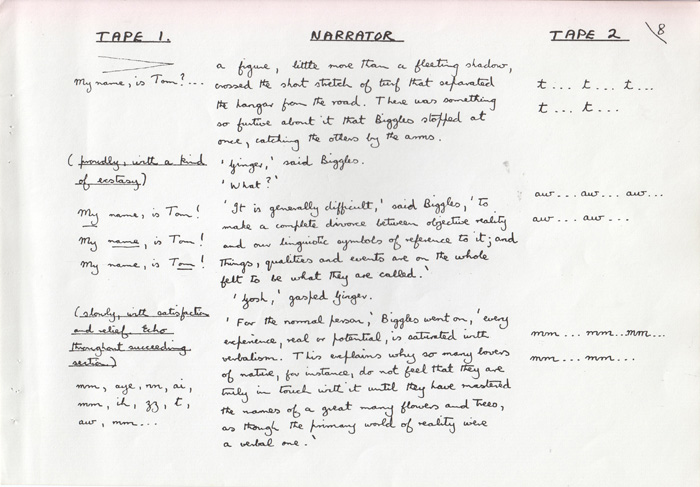
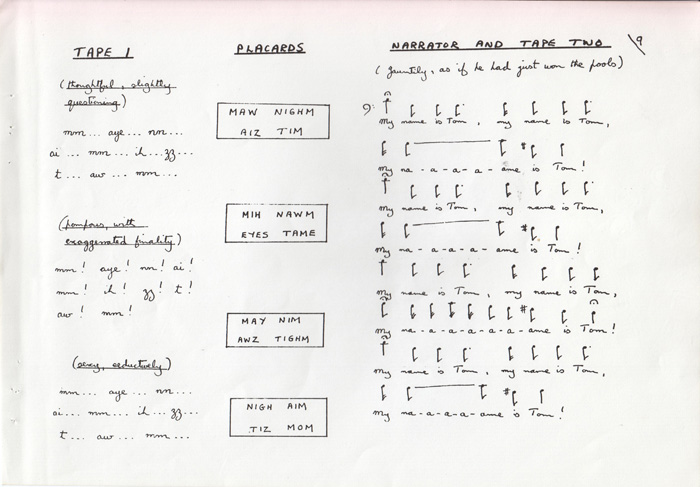
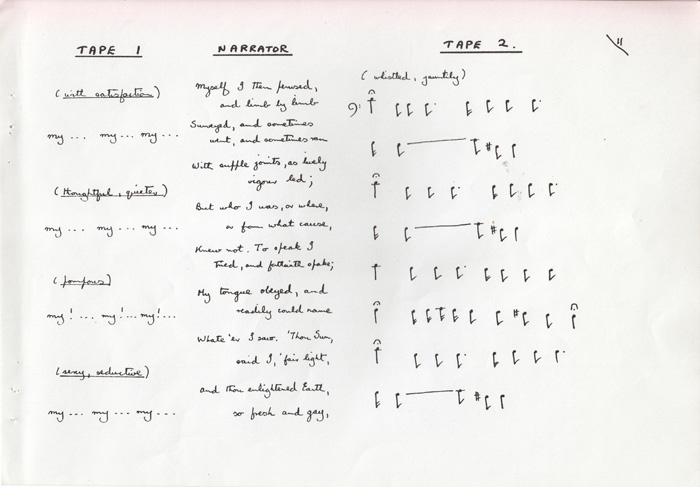
Needless to say all this was way beneath the lofty level of what passes for poetry criticism in Scotland, tut tut the very idea, but Henri Chopin liked what I was doing and wrote this in his Poesie Sonore Internationale. I publish it to give a weary finger once again to the snooties.
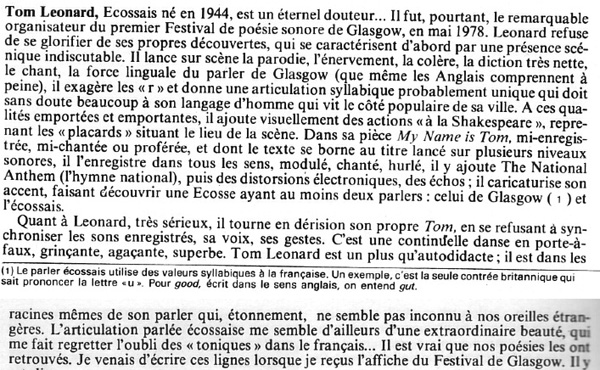
Much so-called mainstream poetry is result and extended function of mainstream classroom teaching: the latter defines the former’s parameters, constraints, exigencies. The students of the one become the producers of the other.
European sound poets of the seventies I knew could attempt breakout sometimes through a seemingly desperate aural sign language set against conventional language supposedly drained of meaning for them. Each of the poets I invited to the Sound and Syntax festival in Glasgow in 1978 seemed to show engaged commitment, some structural passion or non-wanky humour however “elitist” the cry against the narrowness of their popular appeal. Only one, Steve McCaffery, blagged his way onto the stage during the weekend and the work I thought so slick and super-competent, I regretted the festival didn’t end during his performance with a dadaistic rifle shot from the back of the hall.
In Glasgow a deal of visual art has been functioning from artschool department to likeminded gallery curator. Some claim the result as inheritance from Beuys. It's not art for art’s sake, but context-of-art for context of gallery—even when set out of doors. Like most theory-art, it is the articulation of reflection-upon: reflection-of-art for those who claim a surfeit of forced digestion of false history. It becomes the triumph of Intertextuality, original texts the disjected booster rockets, their supposed historic contexts pathologised as fossil fuel.
Likewise literary theory on poetry—peculiarly on poetry as distinct from prose—often seems to be about poets as bastards outed as trying to put one over the reader. I feel sorry for some younger people trying to make their way artistically, or just as humans, aha, through this. Proferred huts in the blasted heath of recession. Yes, baby: it is cold outside. But if you can’t face the cold, maybe you should at least face the self which can’t face it. That might require more courage, and less composure. You would have to consider that there is such a thing as a self. And that could put some theory ball right up on the fucking slates.
Meanwhile, many “victories” of impeccable, cleanly executed inconsequentiality, as politically safe as — galleries, and classrooms. Like the deadening mainstream
![]()
Or forget-me-immediately. Frustrated creative energy has to bust its way out of institutionalised conceptual classroom, set its own narrative that pedagogues in time attempt to accommodate to a school.
Hitherto-stumped pedagogue: "I've got a super idea. Let's call it 'Modernist'!"
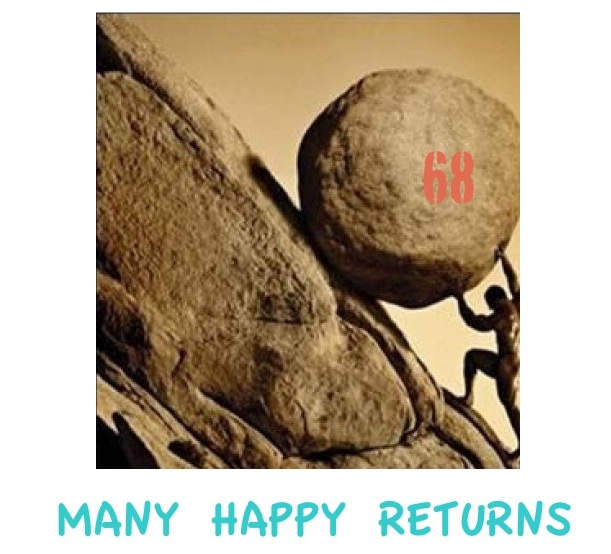
The funeral yesterday of the artist and printmaker Calum MacKenzie, who founded the Glasgow Print Studio in the seventies. That still thrives today and has been a base for and produced a lot of work by sundry Scottish artists over forty years. It was there Calum helped set up The Print Studio Press, a small writers’ co-operative which published a run of publications by Alasdair Gray, James Kelman, Liz Lochhead and a number of others including myself.
A series of prints of writers’ work was also produced by the Glasgow Print Studio in 1976 including one of a poem of my own printed by John Taylor. At the end of that year Calum visited Sonya and I at home and gave us a New Year present of his print “Carthon”. It has always since been a favourite of the prints we have at home.
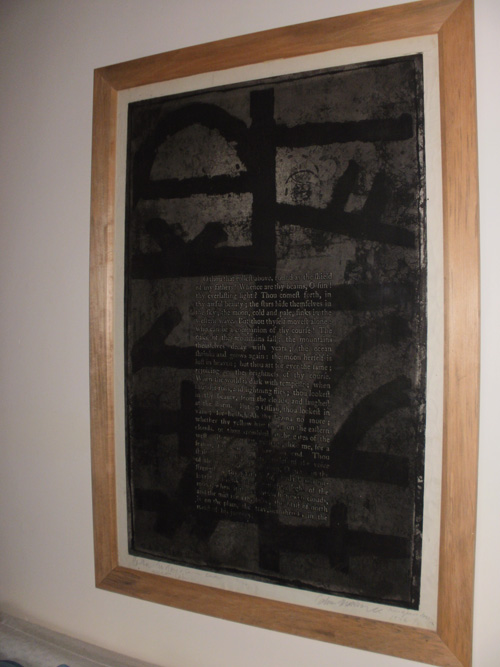
Calum rarely spoke about his own life. An adopted child, he was taken from Glasgow to Tiree when young. His childhood apparently was not a happy one. The Tiree background was responsible for a Highland strain in a deal of his work. He collected editions of Macpherson’s Ossian, and my own copy of that I gave Calum years ago as it was an edition he didn’t have.
“Carthon” forms a chapter in Ossian/ Macpherson’s Fragments of Ancient Poetry. Prefatory scene-setting of the poem states that an uncle of Fingal sought refuge from a storm at sea at Balclutha on the river Clyde. There in time he married, but fled seaward again after a dispute, leaving his wife behind. Pregnant, she died soon after giving birth to a son called Carthon, “murmur of the waves.” When the boy was three, Balclutha was sacked and burnt to the ground. Carthon was taken by a nurse for safety into the country where he grew up. As a man he sought to avenge the sacking of Balclutha, but was unwittingly killed by his own father in a combat. The poem is set the night before his death.
This from an online scan of a 1792 edition of that section of the text that Calum superimposed on the print above.
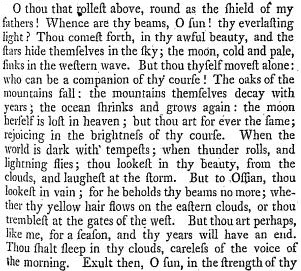

Spent a while yesterday refreshing the content of the home page, online poetry and prose, main publications etc. In the online poetry and prose page I now include three of the kinetic poems that featured somewhere in the journal this past three years. I have made a separate page for selling the book and the CD. In a few months the new prose anthology should be there too. Am told I should get a first proof in September.
August 17th
The poetry reading I gave on May 25th at The Apple Tree in Holborn is now online here
Links to readings by the other poets then, and talks at the Birkbeck Poetry and Revolution conference with which the reading was associated, can be found here
August 16th
You can feel out on a limb doing things like the stuff i was doing a few days ago, so it can be helpful when you see connections back. Taking the photos kind of mapping/ renaming the building I’m living in goes back to my first “Pollok Poster” of about 1970 which now starts outside the narrative.
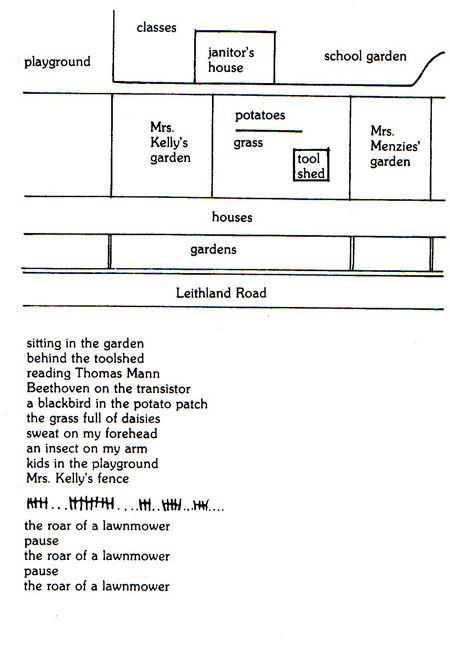
The heavy scoring out of the August 10 entry is like how The Present Tense began; and I think the way I would like it that you have to peep and struggle to build up the remaining words and their connections that show through, reminds me of when I was making my soundpoem stuff in the seventies, and in doing my My Name is Tom where the narrator/singer has to struggle to get the words through to be heard against a double soundtrack, I had in mind Nielsen’s instructions to the snare drummer in his Fifth Symphony, to “improvise as if to drown the progress of the orchestra”. As if, but not quite.
August 15th
This one I did earlier again. First as a postcard, later as epigraph to a poem sequence.
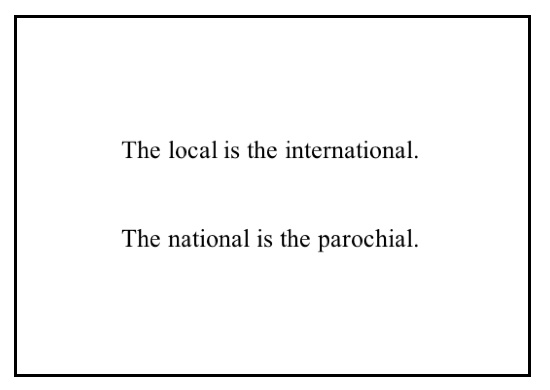
August 14th
One I did earlier.

Winnicott: "It is play that is the universal."
August 13th

August 12th
Have received text of journal entry from two days ago back from the censor's office. Am told I should sleep better, need some decent sleep as my chest is not great and have had a bit of a fever. Reading tomorrow night with a group including Peter Manson and Nicky Melville in WordPower bookshop in West Nicolson Street in Edinburgh.
August 11th
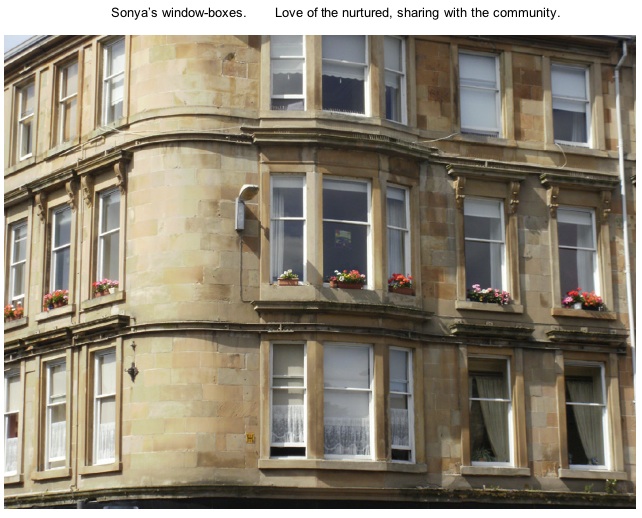
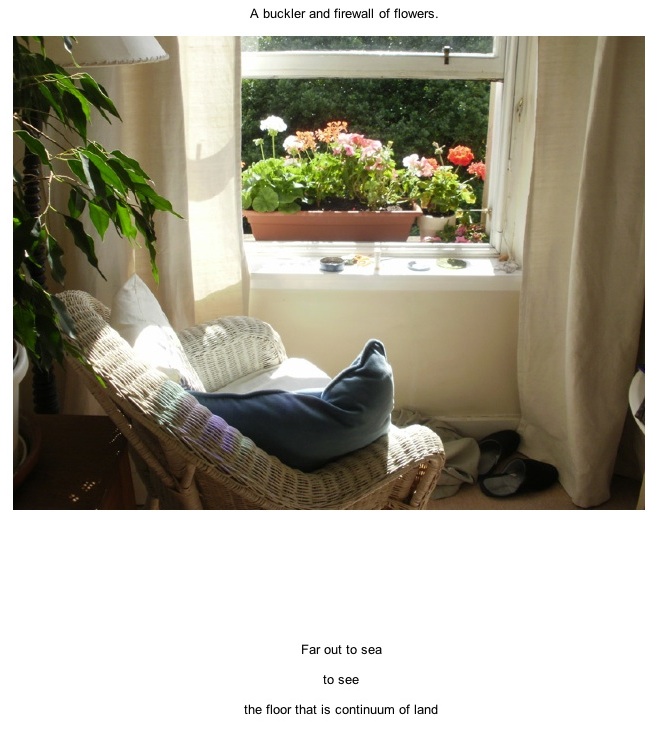
August 10th
Edinburgh Festival starting now. Three years since that coincided with a Scottish review of books having as lead a most carmudgeonly damned-with-faint-praise review of Outside the Narrative. Save me from the Scots, I have a number of times remarked to others on this); the thirty years' work which take up most of the book was more or less simply ignored, and a page and a half was spent raking back and forth in ponderous prose whether or not that part containing my phonetic Glasgow poems of thirty to forty years ago could be considered genuine literature. The headline had the stigmatising dismissal-word “patter.” It eventually said no anthology of Scottish poetry could exclude this work since it was there, but it would be unlikely to be understood in Australia. Being “serious about words” is a big thing in these parts, though its promulgators are not quite so serious about language, though they do not know that. Language is not restricted to dictionary, which is trailer, not engine. But that would be over the head, or worse, the undermining of the core personal identity, of critics such as this; the standing by discrete “Word” they see as the burden of their essence. It is how they understand God, and the god of their own being that they are tasked with overseeing in print.
A deal of Scottish literary criticism, though especially from males, is cursed with this stuff. At root it is not actually a Catholic versus Protestant matter, though that has particular historical figuring in Scotland; for my own part as a writer, save me from the Catholic patriarchs (well, I upped and walked) – as much as the Muslim and Jewish ones to boot. But there are antipodes within these different religions, or religous parties as I think of them; and as I have previously written in this journal, one level of the patriarchy debate can be instanced as “movement for peace and social justice” versus self-appointed defence of sacrosanct text; the latter often characterising themselves as, and attempting to act as, genital police.
Nor is it a matter of Left and Right. In the eighties I would sometimes be reading at both Communist or SWP events. I was glad enough to read at either, I had people with whom I was friendly in both as I still have today, and I pick my way through theirs and other Left publications for that which I find instructive or useful. It was noticeable that the Communist do’s would be in some ways like a good church social; decent folk who could enjoy themselves singing Burns at a Burns Supper, and who welcomed you as one on the Left but would get a bit uncomfortable with poems with swearwords in them or that were in any way, as they would see it, inclined to the bourgeouis individualism of the experimental; the Word was very sacrosanct indeed: the Word was of The Folk, and the Folk were tradition-bearers. The SWP on the other hand, who unlike the Communists were mainly under 35, would welcome your work the punkier the better if they could find time enough to clear a space for you to read among the rock groups’ gear that would usually clutter the stage; and the first few minutes of a reading would be spent trying to establish with the audience that the friend and organiser who had asked you to read had not welcomed into the nest of elevated consciousness one of these maverick poet wankers that had no political consciousness whatever. For the Communists, MacDiarmid was the guardian of the Word, Burns the guardian of the Folk. Communism was the higher form of Presbyterianism that a thinking furth of communism today considers, overtly or subvertly, a democracy of intellect that is purportedly the essence of “Scottishness”. This the “self” that can lurk under the “self-determination” proposition hovering around debates on the independence referendum— debates about which I am unfortunately already terminally bored before they have even properly begun. Whose self is being bodied, and for why? Is this self prescriptive rather than descriptive? Is watermarking the text of an essentialist self not of the essence of patriarchy?
Back to my mother, and to the mother of James Thomson the poet on whose work and life I spent fifteen years of my own life studying. Within the Scottish Protestantism that was the religion and culture into which Thomson’s mother was born, she chose to follow the preacher Edward Irving who died in 1834. He followed upon the anti-Elect preaching of the Rhu Church of Scotland minister John MacLeod Campbell, who had preached effectively against the notion of the predetermined Elect, that in actuality Christ was available to each and every person in their present here-and-now existence; as I described MacLeod Campbell’s preaching in Chapter One of Places of the Mind, “the love shown by Christ was presently and constantly available, throughout each person’s existence. This forgiveness and love was not a thing to be owned, or achieved, but was a given state of being to be realised and acknowledged. Don’t try to do good to win God’s love; realise God’s love and you will try to do good.”
This here-and-now availability of the infinite, the not-discrete, Irving subsumed into preaching that the release from earthly suffering with the coming of the Messiah would be harbingered by evidence shown through ordinary people of what the Apostles had manifested as “the gift of tongues”: the holy spirit of unknown tongues supposedly gifted at Pentecost. Women in Irving’s congregation during service began then to display such glossolalia, emanating dramatic sounds asserting possession of the holy spirit of here-and-now against the constraining, discrete patriarchal word preordained to define and enclose them in unalterable narrative even before they were born. The word of these women’s bible understood through Irving was a summons, if only for a little while, against that word of patriarchy itself. Let us just say that Irving, and the women who followed him, got very bad reviews indeed.
Thomson, in a letter written not long before he died, described his mother’s portrait of Irving “under yellow gauze” that was kept at home in his childhood. Reading that I thought of my own home with the portrait of the Sacred Heart that used to mean so much to my own mother, once sneeringly dismissed by a visiting Scottish academic as merely a symbol of fascism. (The old Scottish “Christians have faith Catholics have superstition” probably lurking under that.) My mother and James Thomson’s mother both worked hard all their life, working hard for their children, even when the children did not appreciate that fully. One was reared to believe that Catholicism was the product of the Antichrist; the other that such work had been found at the Reformation. Were there a heaven, which I have no reason to expect, these two women would be friends there. They can be so in the imaginative history that is literature; and in the here and now, taken.
The opening of the preface to my book on Thomson Places of the Mind, now out of print, I append. The book, seen into print, was first welcomed with a blast of at the time an odd-seeming hatred from a Scottish male writing in an English Sunday newspaper; he at least had the dignity, as I mentioned some time ago in this journal, privately to send me a letter of apology a year later. Re-reading below and above, maybe small wonder instinctive hate and difficulties.
The debate between the behavioural determinist and those who believe in the universal democracy of the individual consciousness, is not of recent development. Some have seen in it the debate between a law-making angry God the Father of the Old Testament, and a loving and forgiving Jesus Christ, of the New. For a person to be born having already inherited the responsibilty for making a perfect father so angry, the children must needs have been very bad indeed. But if one was convinced that in essence one was very bad indeed, it might prove difficult to be convinced at the same time that one was worthy in any capacity to be loved. A belief in the redemptive superhumanity of Christ might be founded therefore on the startling proposition that Christ had the capacity to love that which his father had not thought necessarily lovable at all. It was but a step to the silent thought that the triumph of the Son in his Atonement was not to atone for the sins of humanity against the Father, but to atone for the sins of the Father against humanity.
If the Father thought one's body loathsome and worthy of torment, it might be liberating to be assured one should on the contrary love one's self as well as one's neighbour. If one loved one's self, body and all, one might even be able to love one's neighbour, body and all, without feeling too guilty about it, or without thinking there must be something wrong with them if they felt the same way about you. But whilst loving one's own body, one should nonetheless clear one's mind and heart of what was contrary to love: anger or the desire for vengeance. One should forgive the Father, in other words, for hating you so much. This, eighty years before Freud's Interpretation of Dreams, was the burden of Shelley's lyric drama Prometheus Unbound, in which the tortured Prometheus forgives Jove for torturing him, and thus brings about, through the agency of the god of Necessity - called Demogorgon - the overthrow of Jove from Heaven, and the union of the male Prometheus with the cosmic female creative force, Asia. Prometheus is not Jove’s son, but has sided with humanity against the angry god. When Prometheus accepts himself in his physical suffering and liberates himself from the desire for vengeance, he becomes of necessity more fit to rule in conjunction with the creative female, than the old god of repression who caused the suffering in the first place.
August 7th
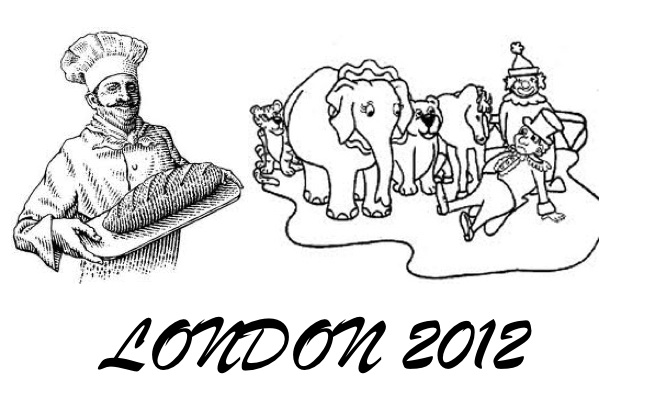
August 4th
The web address details apparently changed some time ago for Pepe Escobar's articles in Asia Times Online so the link to them in my links page had gone dead. Have now fixed it. Escobar's article on Syria today has his usual sweeping perceptions and verve of presentation that I find refreshing. The page topped by today's article is here
August 2nd
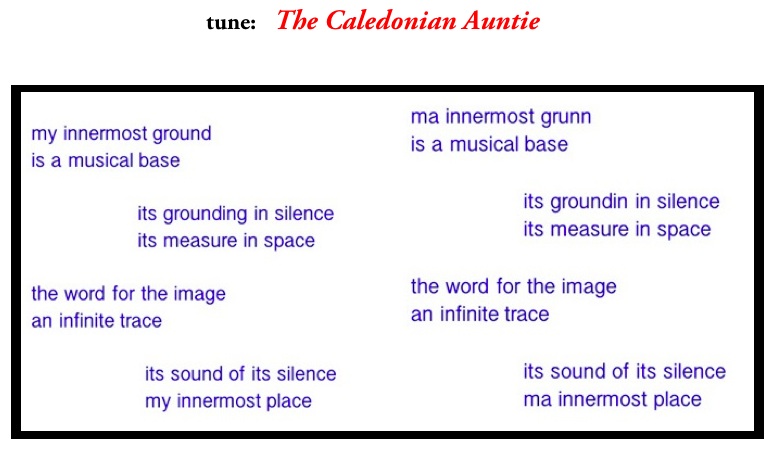
August 1st
Memory of Fuerteventura.
